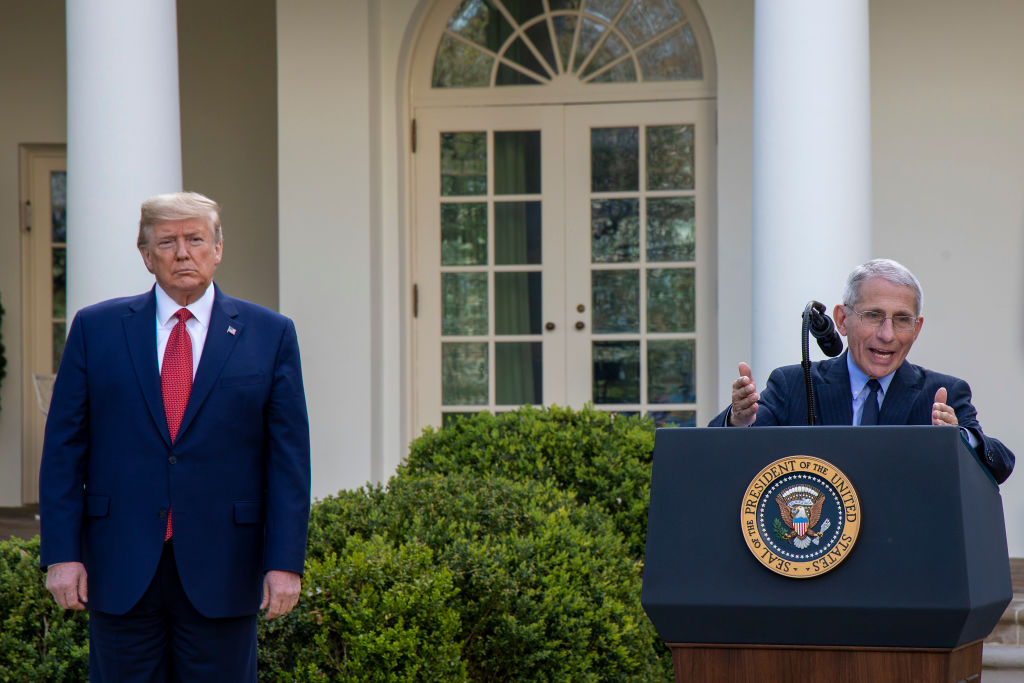As tens of millions of Americans remain stuck at home in self-isolation, the country’s politicians are busy sniping at each other over who is at fault for a epidemic that Dr. Anthony Fauci – Trump’s coronavirus expert – predicts could kill up to 200,000 Americans. It’s a story far more interesting and potentially calamitous than the normal tale of Republicans and Democrats pointing fingers at one another (although there is plenty of that too). America’s federalised system of government is at war with itself.
Take President Trump, the man at the very top of the system. Ducking responsibility when something goes wrong and hogging all the credit when everything goes right is standard operating procedure for this president. That he has spent weeks and weeks promoting himself in public as a strong and decisive leader during this crisis was to be expected. What is surprising, however, is the degree to which Trump genuinely believes his administration is passing this test with flying colours. Despite all evidence to the contrary – Trump lackadaisically dismissing the coronavirus earlier in the year; Trump accepting China’s assurances that the virus was under control; the Centers for Disease Control unveiling inaccurate testing kits; the Food and Drug Administration slow-rolling requests from private labs to generate their own tests – the president has managed to convince himself that the federal government under his stewardship is a well-oiled machine performing at peak level.
‘Look, this is something that is of a magnitude nobody has ever seen before but I will tell you what, the federal government has done a hell of a job,’ Trump told reporters during his daily coronavirus news briefing on Friday. He explained how the federal government delivered thousands of ventilators to New York and Washington State and how the Army Corps of Engineers was literally flying to the most infected parts of the country to build field hospitals in record time. ‘[W]e have done a job the likes of which nobody has seen’ – and if there is blame to go around, it lies on the state and local authorities who are spending more time complaining about the problem than fixing it.
Governors and big-city mayors, of course, aren’t buying what the president is selling. New York governor Andrew Cuomo has been begging for more medical supplies and resources for New York City hospitals until he is blue in the face, repeatedly impressing upon the White House that the state’s entire health care system could collapse if ventilators don’t show up on time. Michigan governor Gretchen Whitmer has said much the same thing, drawing Trump’s famous rage in the process. Even Republican governors in places like Maryland, Iowa, and Ohio are finding some of the administration’s recommendations unpalatable for their states. Trump’s desire to see packed church pews and offices by the Easter holiday was disregarded as reckless at best and an enabler of more death and sickness at worst.
With no leadership at the national level and uncensored, spur-of-the-moment comments from Trump about state lockdowns, governors and mayors are doing what they can unilaterally by drafting their own strategies to cope with the virus. Some of those strategies are angering neighbouring states, as governors fight one another over travel restrictions (in addition to medical equipment on the open market).
An increasing number of governors across the country are treating New Yorkers like lepers; before she walked back her order after withering criticism from authorities in New York, Rhode Island Governor Gina Raimondo tasked the Rhode Island National Guard and state police to go door-to-door in coastal communities in search of New Yorkers to ensure they quarantine themselves. Governors in Texas, Florida, Maryland and South Carolina have ordered people arriving from the New York area to self-quarantine for two weeks. New York’s Cuomo is understandably unhappy about Rhode Island’s order specifically, so much so that he threatened to sue the state. Kentucky is debating about whether to close its border with neighbouring Tennessee. The coronavirus has pitted the federal government against the state government, states against cities, and states against states.
On Sunday, the White House announced that its previous social distancing guidelines will be extended until April 30. There is no doubt that some state governments, particularly low-risk states in the Midwest and centre of the country, hope to return to an era of normality. Unfortunately, the coronavirus has significantly altered what that will look like. The virus is also exposing the fragility of America’s system of government.
Daniel R. DePetris (@DanDePetris) is a political writer based in New York






Comments